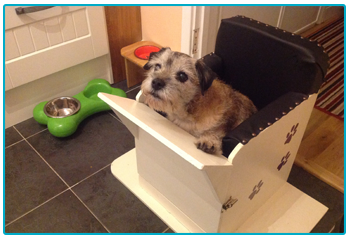It is no cliché to say that our pets really are a part of the family. From the moment they come into our lives, we care for them and treat them exactly as we would a relative. Just like a family member, it can be extremely upsetting and worrying should your pet be struck down by unexpected illness. Especially when that illness is hard to diagnose. This is exactly what happened to Jackie and her Border Terrier Rosie, so we spoke to her to find out what happened.
Puppy love

“Rosie was purchased as a puppy in September 2005. They say that your pets choose you and in this instance that was definitely the case. When my husband first picked Rosie up she proceeded to wee down his front – it was instant love! Rosie was our first dog together and her company was probably the only reason we managed to survive the first two weeks living together after moving out of our family homes! She was so small that, when we took her home, she travelled in the palm of my hand; a very cute, small and furry bundle of joy!”
“Puppyhood was exciting for Rosie and it was clear that she was a complete mischief and full of character. Like your typical teething dog she chewed everything; literally everything! One day we returned from shopping and opened the door to discover the floor covered in foam and no sign of Rosie. It was only when we lifted the side of the sofa that we discovered an excited, smug-looking Border Terrier who had clearly had the most amazing time eating the furniture inside out. We couldn’t help but laugh!”
And when Jackie’s family began to expand, Rosie came into her own more and more.
“As Rosie got older she became a very special dog; she is exceptionally loving, always willing to please and ready to listen when you want a chat! She has always taken everything in her stride, not least following the birth of our twins in August 2011. Having always been the centre of attention, the introduction of two small babies was a big change for her. She absolutely loved the twins and was extremely protective of them, following them around and getting into all sorts of mischief. Rosie is a big part of our family and we have always done our best to include her where possible.”
Rosie’s illness and diagnosis

In early January 2017, Rosie sadly became poorly. What Jackie initially thought was a nasty cough that refused
to go away, was suspected to be Laryngeal Paralysis, before being diagnosed by leading vets at The Queen Mother Hospital for Small Animals at the Royal Veterinary College in Hertfordshire as megaesophagus. A rare condition, it was obviously concerning for Jackie and so she made the effort to find out all about it from the vets.
“Having megaesophagus means that Rosie’s feeding tube, or oesophagus, is enlarged and the act of moving the food along and down into the stomach, known as peristalsis, doesn’t occur properly. What this meant for Rosie was that she was regurgitating food every time she ate, this is dangerous as the food can then enter the trachea and cause aspiration pneumonia, which is life-threatening in itself. Unfortunately, while at the hospital Rosie developed this, leading to a prolonged stay at the hospital for a week, which was upsetting as it was initially supposed to have been just two days.”
Recovery and a seat at the table!

After an emotional period for Jackie and her family, in which Rosie was stuck at the hospital, eventually her little Border Terrier was allowed home to begin her recovery. She is getting better now but Jackie told us about the special routine that goes on at mealtimes.
“Rosie now has to eat sitting in a Bailey Dog Chair, designed specifically for dogs with this condition, which allows her to sit upright. She has her food handfed to her in small meatballs, with liquid in the form of chicken stock-flavoured gelatin cubes or syringed water droplets onto her tongue. Rosie then has to sit in her chair for 20-30 minutes to allow the food to pass down the oesophagus correctly. This process takes place 4 times a day to ensure that Rosie eats enough as she can only consume small amounts at a time.”
Jackie then told us how important having dog insurance was to her and how Rosie is really getting back to her best.
“We were so pleased that Rosie is insured, she has lifetime insurance which means that she is covered for an illness from the time of diagnosis until she is no longer with us. This was important as we would not have been able to afford all the tests and continuing treatment that Rosie needs. Our insurer was always ready to help, answering odd and difficult questions regarding claims and they also showed a huge interest in Rosie, asking how she was doing and reassuring us. The insurance itself has meant that Rosie’s quality of life is not affected and that we can give her everything she needs to help maintain this.”
“Rosie is doing well and has taken to her chair like a real pro! She eats well and is putting on some of the weight that she lost. It is great to have her back as part of the family again and thanks to Rosie’s insurance we can afford to manage this lifelong condition!”
At The Insurance Emporium, we were delighted to hear of Rosie’s recovery and pleased to be able to share the story in order to raise awareness of the rare condition megaesophagus. If you are a dog owner, you may want to consider insurance to help protect you in the event of a situation like Jackie and Rosie’s. Visit the Emporium today and find out how!
All content provided on this blog is for informational purposes only. We make no representations as to the accuracy or completeness of any information on this site or found by following any link on this site. We will not be liable for any errors or omissions in this information nor for the availability of this information. We will not be liable for any loss, injury or damage arising from the display or use of this information. This policy is subject to change at any time.


